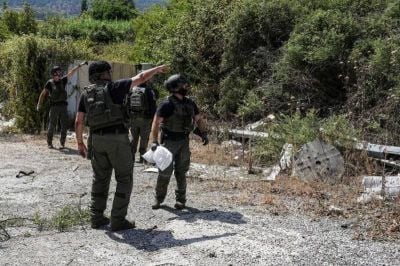
Men walk past the rubble of a building destroyed by an Israeli bombardment in the village of Yaroun, southern Lebanon, near the border with Israel, June 21, 2024. (Credit: AFP)
In the event of an "all-out war" with Hezbollah, the United States has assured Israel of its support, American media outlet CNN reported Friday. The report comes as cross-border strikes by both Israel and Hezbollah, which began on Oct. 8, have intensified in recent weeks.
The U.S. media outlet revealed that senior U.S. officials had "reassured" an Israeli delegation — including Strategic Affairs Minister Ron Dermer and National Security Advisor Tzachi Hanegbi — visiting Washington this week of American support. "Should all-out war break out on the northern border between Israel and Hezbollah, the Biden administration is fully prepared to support its ally, according to a senior administration official," CNN reports. The Israeli delegation met with various Biden administration officials, including Secretary of State Antony Blinken, White House Middle East Coordinator Brett McGurk and National Security Advisor Jake Sullivan, it adds.
But what do these leaks mean at this precise moment in time, when since the beginning of of the latest round of conflict in October, Tel Aviv has failed to get the green light from Washington for a large-scale operation in Lebanon? Firas Maksad, a researcher at the Middle East Institute in Washington, answers L'Orient-Le Jour's questions.
L'Orient-Le Jour: While the United States has stressed that it wanted to avoid a flare-up of the conflict in Lebanon for almost nine months, CNN's leaks would indicate a change in position. Is this the case?
Firas Maksad: After persuading Israel against launching an offensive against Hezbollah immediately after the Oct. 7 attack, and attempting to end Hezbollah’s cross-border attacks diplomatically for almost nine months, the Biden administration now believes diplomacy has run its course. Its red light against an Israeli offensive turned orange, and it may soon turn green.
L'Orient-Le Jour: If the conflict between Israel and Hezbollah were to degenerate into a "full-blown war," what role would the U.S. play in it, and what form would it take? What factors might compel the U.S. to provide Israel with military and logistical assistance?
Firas Maksad: The U.S. prefers to keep any broader Israel-Hezbollah war fairly limited, with a return to diplomacy once the belligerents are ready.
In the meantime, it will play defense for Israel should Israel need it. There is particular concern in Washington that Hezbollah might overwhelm Israeli air defenses. Expect the U.S. to provide intelligence and targeting information, alongside direct interception of Hezbollah drones and missiles if needed. It will not participate in direct offensive operations unless provoked.
L'Orient-Le Jour: CNN's information comes at a time when tensions between Israel and Hezbollah have intensified in recent weeks, despite diplomatic efforts to lower tensions, notably during Amos Hochstein's visit earlier this week. Could this information be seen as pressure from Washington?
Firas Maksad: Intensified Israeli rhetoric and leaks of this kind in the U.S. media is, no doubt, meant to pressure Hezbollah and Iran into accepting a compromise. This, however, does not mean they are bluffing. Preparations for an offensive are ongoing, while efforts aimed at an eleventh-hour compromise continue. The time for diplomacy is running out. A broader war is almost upon us.
